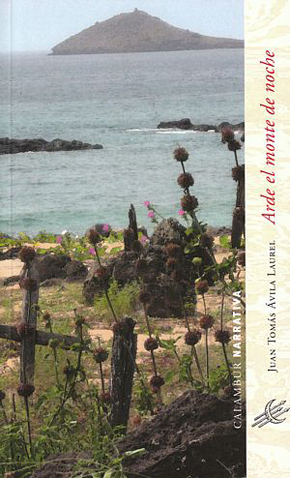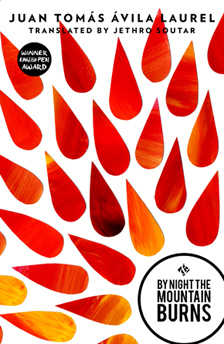Keeping the magic
by Jethro Soutar
Calambur Spanish language edition, 2009
We translators are used to becoming experts on subjects we know nothing about, describing sights we’ve never seen and speaking in voices that are not our own. But translating the Equatorial Guinean novel By Night The Mountain Burns, by Juan Tomás Ávila Laurel, seemed to require a bigger leap of faith than usual. How could a Sheffield lad write like a village elder from an Atlantic island off the West African coast?
The extreme solution would have been to go and live on Annobón Island, where Arde el monte de noche is set, and immerse myself in local culture and customs. Alas the life of a translator affords no such luxuries, and in any case I had enough of a working knowledge of Equatorial Guinea, through translating academic texts and reading Ávila Laurel’s essays, to know it was no visitor’s paradise: in fact it’s an oil-rich kleptocracy ruled with an iron fist by Africa’s longest-standing dictator.
If I couldn’t literally visit the place, I’d have to do so literarily. In Equatorial Guinean terms, that’s not so easily done either: published works in Spanish, the country’s official first language, are few and far between. As for translations, prior to By Night The Mountain Burns, the only Equatorial Guinean book published in English was Shadows of Your Black Memory by Donato Ndongo, translated by Michael Ugarte. But I was reluctant to start my reading there: I didn’t want to be immediately instructed by what someone else had done; I wanted to give my instinct a chance to get to work first.
I also didn’t want to be unduly influenced by translations: in order to imagine how By Night The Mountain Burns might have come out if written in English, I understood that I had to read books from the region originally written in English. The nearest English-speaking country to Equatorial Guinea is Nigeria, which helpfully has a wonderfully rich literary tradition. I began my research by reading Chimamanda Ngozi Adichie’s Half of a Yellow Sun and Wole Soyinka’s The Man Died, not for direct guidance in shaping my narrator’s voice, but for overall orientation: both books gave me post-colonial context and a sense of how multilingual countries use their former colonial languages.
I needed a very practical understanding of what was happening in order to make things magical in English too. If a little boy walks naked past a she-devil’s house, how, exactly, does she stick a saucepan in him?”
The next book on my reading list was The Palm-Wine Drinkard by Amos Tutuola. I was blown away: it is a stunningly inventive tale that had me laughing out loud in its audacity. It was written in English, but sounds translated, because in a way the narrator is translating, if only in his own head, from Yoruba to English. By Night The Mountain Burns was written in Spanish, but the narrator’s first language is Fa d’Ambu, also known as Annobonese, the language of Annobón Island. (Equatorial Guinea is a former Spanish colony and Spanish is the official first language, but its people also speak Fang, Bube, Ndowe and Annobonese, among others.) I didn’t want to be as inventive as Tutuola, because Ávila Laurel’s Spanish is not as unconventional, and Fa d’Ambu, as a Portuguese creole, is rhythmically closer to Spanish than Yoruba is to English. But reading Tutuola gave me a sense of freedom and put me in a playful mood: if nothing else, it persuaded me that ‘los muertos‘ in Arde el monte de noche should be ‘the deads’, plural, in By Night The Mountain Burns.
I had already sent Ávila Laurel a long list of queries, which he dutifully answered, but there were subtler questions I felt needed to be discussed in person, so I flew to Barcelona, where he lives in exile. We discussed the book’s narrator, what he does and doesn’t know, what is fact and what is fiction, why the number of crosses on page 99 doesn’t tally with the number of people listed as dead on the next page… Ávila Laurel sat back in his chair to digest the question, then laughed and laughed. Had I really counted them? (I had, all 152.) It had never occurred to him that anyone might.

“Survival, hope and despair wrestle in this surprising work by Equatorial Guinea’s leading author.” Financial Times
We moved on to less prosaic matters. I said I understood that the book featured superstitious beliefs and magic, but that as a translator I needed a very practical understanding of what was happening in order to make things magical in English too. If a little boy walks naked past a she-devil’s house, how, exactly, does she stick a saucepan in him? Ávila Laurel laughed again, but he knew what I was getting at. The boy would get a pain in his stomach and it would be understood that he had a saucepan inside him, but there’d be no physical sign of it, no saucepan shape bulging out of his sides.
I now knew what needed to be said, just not how to say it. Until I read Ben Okri’s short story ‘Incidents at the Shrine’. Anderson, the story’s main protagonist, is found to have a padlock, a cowrie and a rusty nail in his shoulder. “Who sent them into you?” he is asked. Thus I borrowed Okri’s phrase ‘send into’, as I did his word ‘ministrant’.
In my quest to find a mouth with which to tell the story, I inevitably turned to Things Fall Apart by Chinua Achebe. I adopted several words and turns of phrase from the book, not least ‘moonlight nights’, which, like ‘the deads’, caused a fair amount of trouble for copyeditors and proofers.
Nigeria is not the only Gulf of Guinea country where English is spoken. French dominates in Cameroon, but English is also an official language. Mbella Sonne Dipoko is the most celebrated English-language writer from Cameroon and his novel Because of Women is set on the banks of the River Mungo. In By Night The Mountain Burns, the men of Annobón Island go out in ‘cayucos‘ to fish. I had planned to translate ‘cayuco‘ as kayak, to preserve the sound, but Because of Women speaks of men paddling canoes; I decided canoe was therefore the better fit. I had likewise been deliberating over whether the oil used in By Night The Mountain Burns for cooking and lighting lamps should be ‘oil’, ‘paraffin’ or ‘kerosene’; Because of Women talked of palm oil and kerosene, so I followed suit.
Thus I made my way in magpie fashion, solving problems by plucking words from those who spoke the region’s English in a way I did not. But there was still something missing.
The Spanish used in Arde el monte de noche, and by turn on Annobón Island itself, has an old-fashioned quality to it. Spanish was brought to the island as a colonial language, official and pompous; once there, it rubbed shoulders with a local language before becoming artificially preserved, as if in a bell jar, when the island spent Equatorial Guinea’s post-independence years in total isolation (the period described in By Night The Mountain Burns). The resulting Spanish has an archaic peculiarity to it, which in English terms brought India to mind.
There are many ‘desgracias‘ in By Night The Mountain Burns, a Spanish word that might be translated as ‘misfortune’ or ‘accident’, ‘tragedy’ or ‘disaster’. I wasn’t satisfied with any of them: the desgracias in the book involve human error and these words sounded too much like acts of God or simple bad luck. I was blocked, stuck. Then I watched Nayak (The Hero), and heard characters speak of ‘catastrophes’ and ‘calamities’. I’d previously ruled both words out as being too silly, but they sounded different in an Indian mouth, more menacing, less slapstick. Into By Night The Mountain Burns they went, and thus I was rescued from translatory desgracia by cinema: not Nollywood or even Bollywood, but the films of Satyajit Ray.
 Jethro Soutar has translated Argentinian and Brazilian crime novels for Bitter Lemon Press, written two non-fiction books, and recently co-edited The Football Crónicas, a collection of football writing from Latin America. He divides his time between London and Lisbon. By Night the Mountain Burns, published by And Other Stories, was chosen as one of the Financial Times’ seven best translated books of 2014, and has been shortlisted for the Independent Foreign Fiction Prize 2015. Read more.
Jethro Soutar has translated Argentinian and Brazilian crime novels for Bitter Lemon Press, written two non-fiction books, and recently co-edited The Football Crónicas, a collection of football writing from Latin America. He divides his time between London and Lisbon. By Night the Mountain Burns, published by And Other Stories, was chosen as one of the Financial Times’ seven best translated books of 2014, and has been shortlisted for the Independent Foreign Fiction Prize 2015. Read more.

